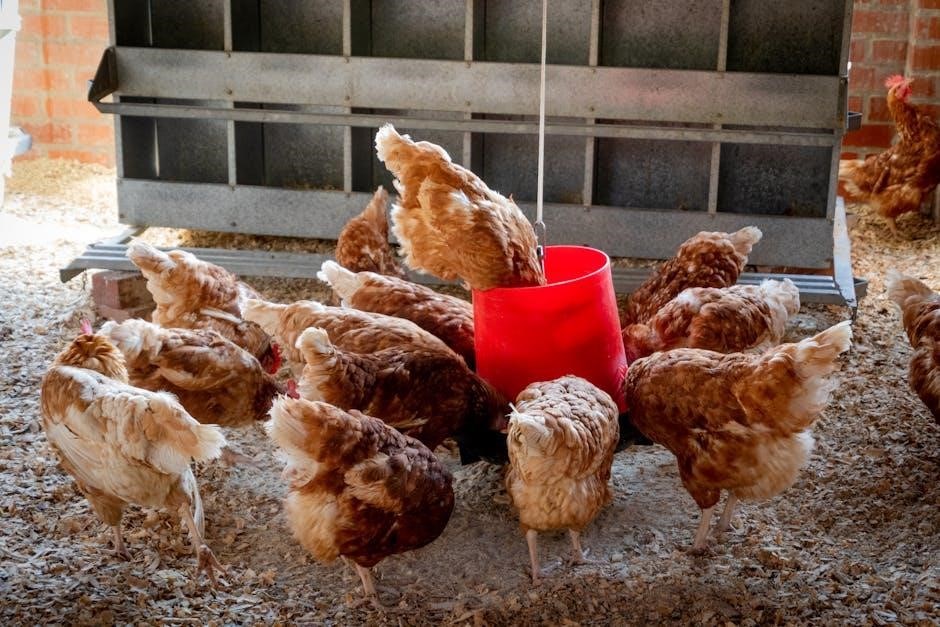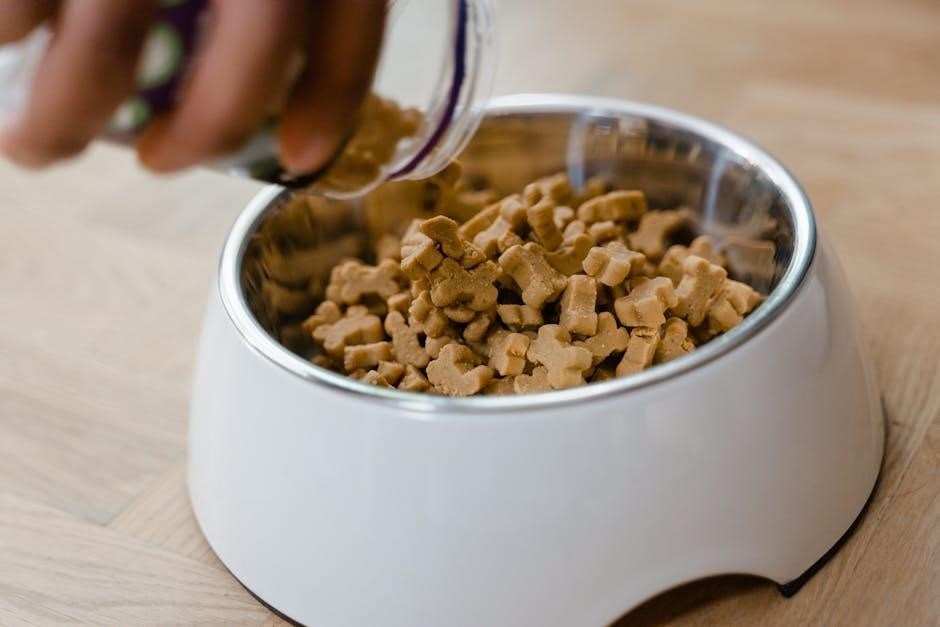Welcome to the Fromm Puppy Food Feeding Guide, your comprehensive resource for nurturing your puppy’s growth. This guide provides expert advice on feeding schedules, portion sizes, and transition tips to ensure your puppy thrives. Discover how to meet their nutritional needs and avoid common feeding mistakes for a healthy, happy start in life.
Overview of Fromm Puppy Food
Fromm Puppy Food is a high-quality, nutrient-rich option designed to meet the unique needs of growing puppies. Made with premium ingredients like real meats, whole grains, and essential vitamins, it supports healthy growth and development. Fromm offers various formulas tailored to different life stages and breed sizes, ensuring balanced nutrition for optimal energy and vitality. With no harmful additives or fillers, Fromm Puppy Food prioritizes your puppy’s health and digestive well-being. Its reputation for excellence makes it a trusted choice among pet owners seeking a reliable, nutritious diet for their young dogs.
Importance of Proper Feeding for Puppies
Proper feeding is crucial for puppies, as it lays the foundation for their future health and well-being. A balanced diet ensures optimal growth rates, strong immune systems, and healthy development of organs and tissues. Nutritional deficiencies or excesses can lead to long-term health issues, such as obesity or developmental problems. Feeding the right amount at the right times helps establish a routine, preventing overeating or undernourishment. By providing high-quality, age-appropriate food, you set your puppy up for a lifetime of vitality and happiness, making every meal a stepping stone toward a thriving adulthood.

Key Nutritional Needs for Puppies
Puppies require a diet rich in high-quality protein for muscle growth, vitamins for immune support, and minerals for bone development. Balanced fats provide energy, while carbohydrates support digestion. Essential nutrients like calcium, phosphorus, and omega fatty acids ensure proper growth and development. Fromm Puppy Food is formulated to meet these needs, offering a nutrient-rich blend that supports healthy growth, energy levels, and overall well-being during critical development stages.


Protein Requirements for Growth
Puppies require high-quality protein to support rapid growth and muscle development. Fromm Puppy Food features real meat like chicken, fish, or beef as the first ingredient, ensuring essential amino acids. Protein helps build tissues, repair cells, and sustain energy levels. Adequate protein intake is vital for proper development, particularly during the first year. Fromm formulations are designed to meet these needs, avoiding filler proteins and focusing on digestible sources. A balanced protein intake promotes healthy muscle tone and supports overall growth, making it a cornerstone of a puppy’s diet.
Role of Vitamins and Minerals in Development

Vitamins and minerals are crucial for a puppy’s overall development, supporting immune function, bone health, and energy production. Fromm Puppy Food is enriched with essential vitamins like D, E, and A, which promote healthy skin, vision, and immune responses. Minerals such as calcium and phosphorus are vital for strong bone growth and development. These nutrients work synergistically to ensure optimal health and prepare your puppy for a vibrant life. A balanced mix of vitamins and minerals in Fromm Puppy Food helps support growth spurts and maintains overall well-being during critical developmental stages.
Importance of Balanced Fat Content
Fat content plays a vital role in a puppy’s diet, providing essential energy for growth and development. Fromm Puppy Food is formulated with balanced fats to support optimal health. High-quality sources like chicken fat and fish oil ensure puppies receive necessary calories and omega fatty acids. These fats aid in skin health, coat condition, and brain development. A balanced fat content also helps maintain energy levels and prevents obesity when portioned correctly. Ensuring your puppy gets the right amount of fat supports overall vitality and ensures they thrive during their critical growth stages.

Daily Feeding Schedule for Fromm Puppy Food
Feed your puppy 3-4 times daily until six months, then gradually switch to twice daily. Adjust portions based on size, activity, and growth. Consult your vet for a personalized plan.
Feeding Recommendations by Puppy Size
Fromm Puppy Food offers tailored feeding guidelines based on your puppy’s size. Small breeds (under 20 lbs) need 1/4 to 1/2 cup per 10 lbs daily. Medium breeds (20-50 lbs) require 1/2 to 3/4 cup per 10 lbs. Large breeds (over 50 lbs) should have 3/4 to 1 cup per 10 lbs. Adjust portions as your puppy grows, ensuring not to overfeed. Monitor weight and adjust accordingly. Always transition gradually and consult your vet for personalized advice to meet your puppy’s unique needs and ensure optimal growth.
Adjusting Portions Based on Activity Levels
Adjusting portions based on activity levels is crucial for your puppy’s health. Active puppies requiring more calories should be fed slightly larger portions, while less active ones may need smaller meals to prevent overfeeding. Monitor your puppy’s weight and adjust their food intake gradually. Ensure not to overfeed, as this can lead to obesity and related health issues. Also, consider the calories from treats and factor them into their daily meals. Always transition gradually and consult your vet for personalized advice tailored to your puppy’s specific needs and activity level.

Transitioning to Fromm Puppy Food
Transitioning your puppy to Fromm Puppy Food should be done gradually to prevent digestive upset. Start by mixing a small amount with their current food, then slowly increase the proportion over 7-10 days. Monitor their reaction and adjust the pace if needed. This ensures a smooth adaptation to the new diet, maintaining their health and energy levels throughout the process.
Gradual Transition to Prevent Digestive Issues
A gradual transition to Fromm Puppy Food is essential to prevent digestive issues such as upset stomachs or diarrhea. Start by introducing a small portion of Fromm Puppy Food mixed with their current diet, gradually increasing the proportion over 7-10 days. This allows your puppy’s digestive system to adjust smoothly to the new ingredients. Monitor their behavior and stool quality during this period. If any adverse reactions occur, slow down the transition process. Consistency and patience are key to ensuring a seamless switch without compromising your puppy’s health and comfort.
Monitoring Your Puppy’s Reaction
Monitoring your puppy’s reaction to Fromm Puppy Food is crucial during the transition period. Watch for signs of digestive upset, such as vomiting, diarrhea, or lethargy. Observe changes in stool quality, energy levels, and overall appetite. If your puppy experiences discomfort, slow the transition process or consult your veterinarian. Positive reactions include consistent energy, healthy stool, and a shiny coat. Adjust the feeding schedule or portion sizes if needed to ensure your puppy adapts smoothly. Regular monitoring ensures a successful transition and maintains your puppy’s health and well-being throughout the process.

Common Mistakes to Avoid When Feeding Your Puppy
Avoid overfeeding or underfeeding, as both can harm your puppy’s growth. Inconsistent feeding schedules and ignoring portion guidelines are also common errors that can lead to health issues.

Overfeeding and Underfeeding Risks
Overfeeding can lead to obesity, joint issues, and diabetes, while underfeeding may cause stunted growth and weakened immunity. Both extremes disrupt a puppy’s metabolic balance, affecting long-term health. Monitor food intake carefully, adhering to recommended portions based on size and activity. Treats should not exceed 10% of daily calories to prevent weight gain. Consult your vet to determine the ideal weight and adjust feeding accordingly. Consistency is key to avoiding these risks and ensuring your puppy develops properly. Always measure portions accurately and avoid free-feeding to maintain a healthy weight.
Negative Effects of Inconsistent Feeding Schedules

Inconsistent feeding schedules can disrupt a puppy’s digestive system, leading to issues like diarrhea, constipation, or upset stomachs. Irregular meals may cause poor nutrient absorption, affecting energy levels and growth. Puppies thrive on routine, and unpredictable feeding times can create anxiety or overeating habits. Skipping meals may result in low blood sugar, especially in small breeds. Conversely, overeating at inconsistent intervals can lead to obesity. A consistent schedule ensures proper digestion, balanced growth, and a calm demeanor. Stick to a regular feeding routine to support your puppy’s overall health and well-being.
Consistency is key in puppy feeding. Monitor growth, ensure balanced nutrition, and stick to a routine for optimal health and development.
Final Tips for a Healthy Feeding Routine
Establish a consistent feeding schedule and monitor your puppy’s weight and energy levels. Adjust portions based on growth and activity. Provide fresh water always. Gradually introduce new foods to prevent digestive upset. Avoid overfeeding and stick to recommended serving sizes. Consider your puppy’s breed and size when selecting Fromm formulas. Regular vet check-ups ensure they’re on the right track. Maintain a balanced diet and avoid unnecessary treats. Patience and attention to your puppy’s needs will promote a healthy, thriving companion.

Leave a Reply
You must be logged in to post a comment.